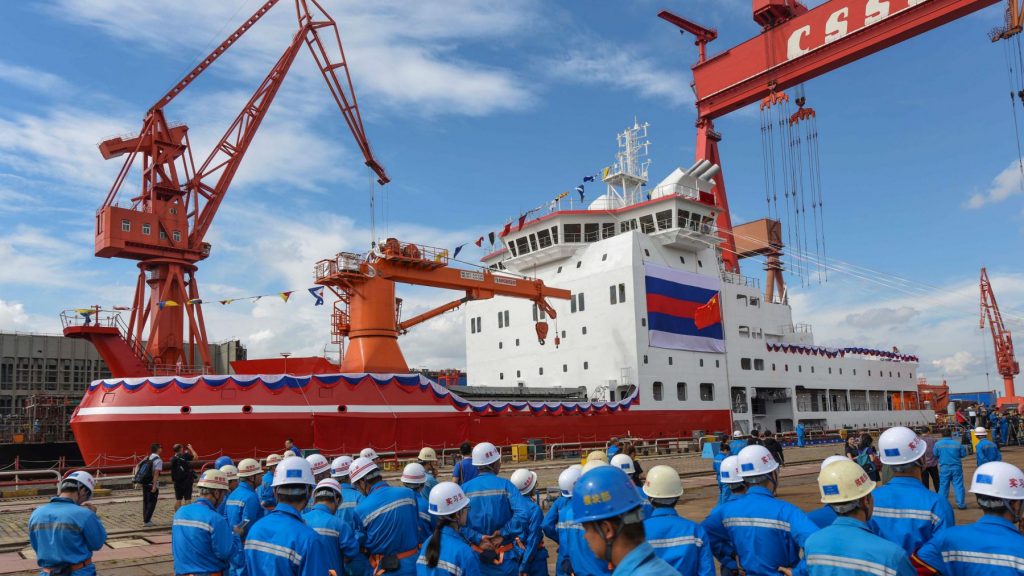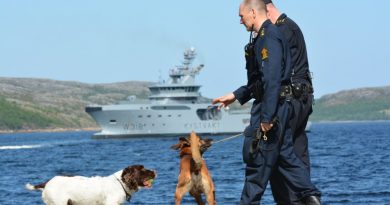Chinese icebreaker sails to North Pole, explores remote Arctic ridge

The Xue Long 2 (Snow Dragon 2) is on its second Arctic voyage during which it will conduct scientific surveys in the Gakkel Ridge.
The 122 meter long vessel on the 12th of July set out from Shanghai on an odyssey across Arctic waters. In the course of 3,5 months, the icebreaking ship will sail about 15,000 nautical miles.
It is the first scientific voyage to the region during China’s 14th Five-Year Plan period (2021-2025), state media company CGTN informs.
On the 4th of August the ship was sailing north of Russia’s New Siberian Islands and two days later north of Severnaya Zemlya.
According to the Chinese, the Snow Dragon 2 will sail across the North Pole. On its way, it will explore the Gakkel Ridge in order to learn about the formation of rocks and magma and the geomorphic features there, CGTN reports.
Sea ice monitoring
The Chinese vessel is this week believed to have sailed south through the Greenland Sea, the waters that separate Greenland with the archipelago of Svalbard. The vessel is no longer visible on ship tracking services.
The researchers on board are reported to engage in monitoring of sea and sea-ice, atmosphere, microplastics and ocean acidification in the high seas of the Arctic, and carry out navigation observation, cross-sectional survey and satellite remote sensing.
The Xue Long 2 (“Snow Dragon 2”) is owned and managed by the Chinese Polar Institute. The institute has been instrumental in all of the country’s previous 10 research expedition to the Arctic.
It is the second time that the Xue Long 2 takes part in the expedition. The ship is China’s first full domestically made vessel of the kind. Construction was competed in 2019.
The ship has advanced oceanographic and research equipment and can carry out a wide range of scientific expedition tasks.
‘Arctic environment is a common responsibility’
Until now, it has been sister ship Xue Long that has been applied on the Chinese Arctic expeditions, that have proceeded along Russia’s Northern Sea Route, across the central Arctic Ocean and through Canada’s Northwest Passage
In a comment made during the Arctic Circle China conference in 2019, Chief of China’s State Oceanic Administration underlined that “protecting the Arctic environment is a common responsibility and China will make its contribution to this.”
He also stressed that China sees itself as “a near-Arctic state” and it will “actively participate with wisdom and strength to future protection and development.”
In early 2018, the country adopted and Arctic policy document. It highlights joint efforts and cooperative approaches, and at the same time underlines that China is determined to participate in Arctic governance and that it has legitimate interests and rights in the region.
Related stories from around the North:
Canada: 44 per cent increase in unique ships entering Canada’s Northwest Passage, says report, Eye on the Arctic
Estonia: Estonian president favorable towards Arctic railway project, cautious about future of Arctic shipping, Eye on the Arctic
Finland: Lapland Regional Council in Finland rejects Arctic railway, The Independent Barents Observer
Norway: Shipping, climate & business opportunities in the North: Q&A with the Arctic Economic Council, Eye on the Arctic
Russia: Russian nuclear-powered cargo ship returns to Arctic after troublesome year, The Independent Barents Observer
United States: Cruise ship arrives in Skagway, Alaska after passenger flown home with COVID-19, CBC News



